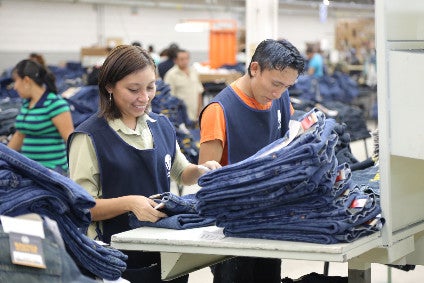
VF Corporation, owner of brands including The North Face, Timberland and Vans, has announced a series of new sustainable packaging goals, including a pledge to eliminate all single-use plastic packaging, including polybags, by 2025.
All remaining non-plastic packaging used by VF and its brands will be reduced, originate from sustainable sources, and be designed for reuse or recyclability.
“With a portfolio comprising some of the world’s most iconic apparel and footwear brands, we recognise we play an important role as environmental stewards and can serve as a catalyst for industry movements that drive positive change,” says Jeannie Renné-Malone, vice president of global sustainability for VF. “Our new global packaging goals are an example of how we can leverage our scale for significant impact. In just one year, we could potentially eliminate as many as 100 million polybags from our packaging waste.”
Given the magnitude of plastic packaging waste in today’s world, VF says the focus on sustainable packaging is a critical component of its global sustainability strategy. VF’s sustainable packaging goals also include:
- All single-use plastics in product packaging will be 100% recycled, bio-based content, or a combination of the two by 2023.
- All paper-based packaging will be recycled content (minimum 80%, where performance allows), third-party certified virgin content, or a combination of the two by 2023.
- VF will commit to leadership in crucial industry coalitions and policy initiatives to build circular packaging infrastructure that will enable its 2025 pledge.
VF is a long-standing participant of Canopy’s Pack4Good initiative, committing that its paper packaging doesn’t contain materials from Ancient and Endangered Forests or other controversial sources and reduces overall forest fibre consumption for packaging.
The group and its family of brands has also subscribed to additional complementary guidelines and sustainability goals that will support its new Sustainable Packaging initiative and commitment to minimising waste across the enterprise.
- All non-essential, single-use plastics for which there is a viable product alternative will be eliminated from VF’s offices, throughout its direct operations, and from all company-sponsored events by 2023.
- All VF-owned distribution centres will be zero-waste by 1 April, 2021.
- VF seeks to implement sustainability best practices in its internal and external sponsored events.
- VF is committed to working with retailers and industry peers to support the development of collection platforms and recycling technology.
- VF’s Icebreaker brand has an ambitious goal to be plastic-free by 2023, eradicating synthetics from its entire product collection within three years.
- VF’s Timberland brand has outlined a vision for its products to have a net positive impact by 2030. By designing 100% of its products for circularity, the brand will work toward zero waste. And, by sourcing 100% of its natural materials through regenerative agriculture, the Timberland brand will contribute to its net positive impact on nature.
- VF’s The North Face brand first launched a Polybag Brigade recycling programme with TerraCycle in 2011 and to date has recycled more than 5m polybags.
Last month, VF enhanced its traceability mapping programme by disclosing its tier 1 to tier 4 supplier information.


